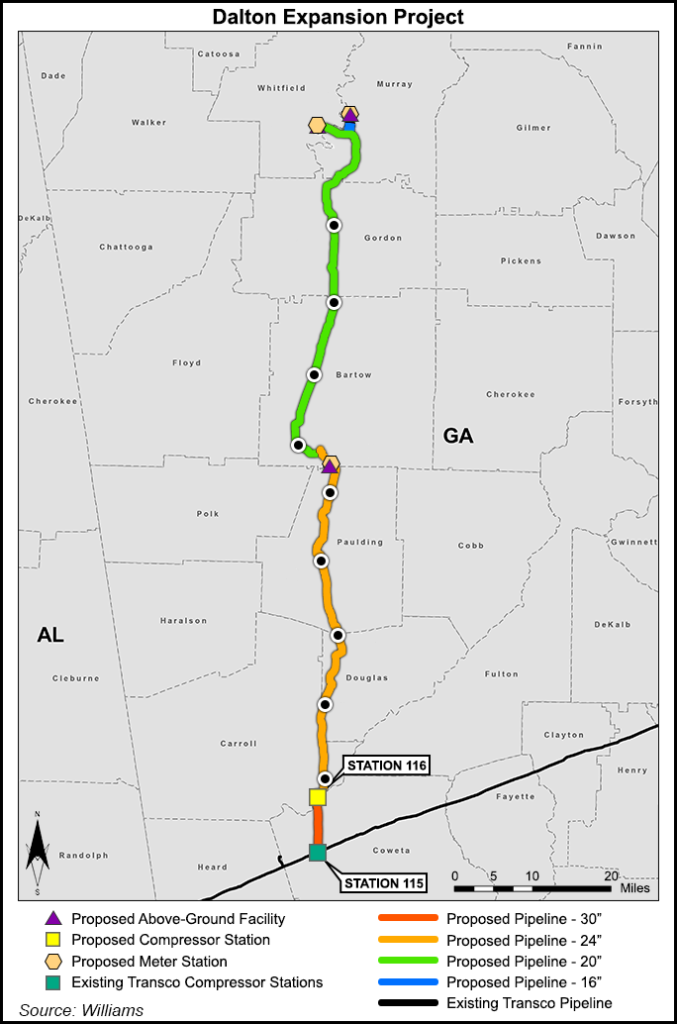Regulatory | E&P | NGI All News Access
Dalton Expansion Foes Urge FERC to Block Project Over Use of Non-Domestic Pipe
Attorneys representing landowners opposed to the Dalton Expansion Project have asked FERC to block the project, alleging Transcontinental Gas Pipe Line Co. (Transco) ran afoul of a directive by the Trump administration requiring domestically produced iron and steel in pipelines.

According to a complaint filed Monday by the Cartersville, GA-based law firm Evans & Rhodes LLC, a section of pipe awaiting installation by Transco had the words “made in Greece” stamped on the inside. The firm told the Federal Energy Regulatory Commission [CP15-117] that a 180-day emergency stay is justified because Transco’s use of pipe not made in the United States runs counter to a presidential memorandum issued last month by the Trump administration, requiring the use of domestically produced iron and steel products for pipelines.
The Dalton Expansion Project calls for construction of 112 miles of new pipeline, ranging from 16 to 30 inches in diameter, from the existing Transco pipeline at Station 115 in Coweta County, GA, to new delivery points in Georgia’s Bartow and Murray counties. The project also includes a new compressor facility in Carroll County, GA, as well as three new metering facilities and other related pipe and valve modifications to existing facilities. Transco also plans to modify existing facilities along its mainline in Virginia and North Carolina to accommodate bi-directional flow.
“At the least, a temporary stay should [be issued] until such time as the Commission can consult with the Secretary of Commerce and other executive department officials to ascertain the intent of the memorandum with respect to ongoing projects that are currently using non-American made materials,” the law firm said.
Williams spokesman Chris Stockton said “there is simply no merit to this claim.”
“We are working on a formal response which we will file shortly with the Commission, but we do not expect this to preclude us from completing our Dalton Expansion project on schedule,” Stockton told NGI’s Shale DailyThursday. “When it comes to pipe procurement, I’d like to emphasize that our first preference is always to acquire pipe from domestic mills when possible. In this case, there was such a high demand for steel pipe at that time of the pipe order that that there simply wasn’t available mill space to process our order in the timeframe needed.”
Stockton added that the memorandum “calls for use of U.S.-produced materials and equipment in all pipelines ‘to the maximum extent possible.’ The executive memo directs the Commerce Secretary to ‘submit the plan to the President within 180 days of the date of this memorandum.’ Clearly a critical fact in making this determination will be an assessment of the ability of mills and pipe manufacturing facilities in the United States to produce sufficient pipeline-quality steel and manufactured pipe to meet the demands of the energy pipeline industry.”
Catherine Landry, spokeswoman for the Interstate Natural Gas Association of America, concurred.
“The landowner group appears to be misinformed as to the nature of the president’s instruction to the Secretary of Commerce,” Landry told NGI’s Shale Daily. “In his memorandum, the president directed the secretary to develop a plan to be presented to him within six months. Since there is as yet no plan, nor action by the president to implement a plan, there is no basis for any stay of the FERC’s order in this proceeding.”
Stockton said construction of the pipeline is more than 50% complete, and the project remains on schedule to be placed into service this summer.
The pipeline lateral is designed to connect the Transco mainline to an existing power plant in northern Georgia operated by Oglethorpe Power Co., and to provide natural gas to a local distribution company operated by Atlanta Gas Light Co. An open season was completed in April 2014, with shippers signing up for 100% of the project’s 448,000 Dth/d of firm capacity.
© 2024 Natural Gas Intelligence. All rights reserved.
ISSN © 2577-9877 | ISSN © 2158-8023 |
